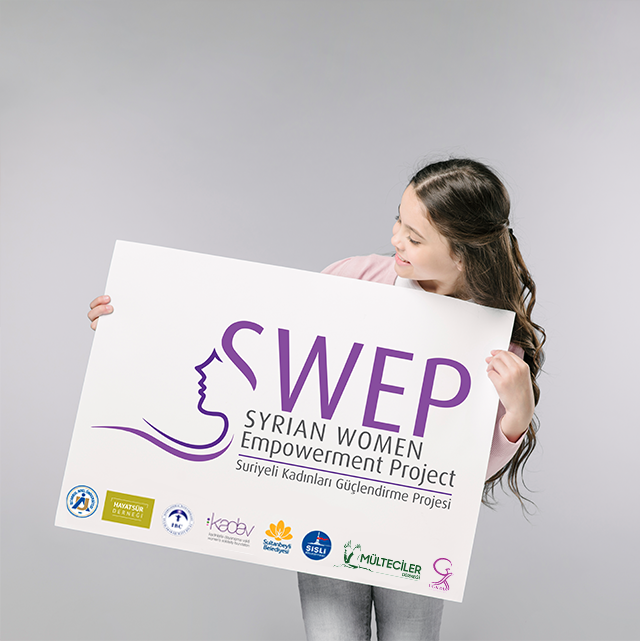
What is Syrian Women Empowerment Project (SWEP)?
Syrian Women Empowerment Project (SWEP) aims to prevent the ethnic based, race based and gender based discrimination and minimize their effects for Syrian women who left their countries due to the war in Syria supporting them with women’s solidarity sustained with academic background.
The results of this project are to support the mechanisms based upon the ethnical, race and gender discrimination and raise awareness in this respect.
According to the Home Office (Ministry of the Interior) with the date of 11 October 2018, the number of the Syrian women registered in Turkey with regard to the biometrical data is 3 million 585 thousand and 738 people. 1 million 945 thousand and 951 of these people are men while 1 million 639 thousand and 787 are women. The existing migration to Turkey has structural effects on the Turkish society. As the surveys on migration show migration has a gender and women and girls are affected due to the results of migration in a more vulnerable way. Women and girls are more often subjected to the structural, discoursive, symbolic and direct violence during the migration and within the society they have migrated to. To create a more equal, just and multi cultural society, the integration of the refugee and migrant women into the receiving society is essential which requires to defeat violence against refugee and migrant women and to fight all forms of gender-based violence and violence based upon the ethnical and race based discrimination.
Syrian Women Empowerment Project aims to contribute to the integration of women who have migrated from Syria to Turkey, women in refugee status and in the status of temporary protection or have become Turkish citizens and to the empowerment of them within the Turkish society. The concept of the empowerment includes the achievement of resources and sources enabling women realize their own power and potential and at the same time raising their awareness about their rights and opportunities. In this respect, this project aims to develop subjectivity practices while providing Syrian women with trainings and courses which will have a direct impact on their lives and to strengthen the relationship between women and respective authorities to give them the opportunity to easily oversome their problems they encounter in the regions they live in.
This project aims to strengthen the mechanisms, prevent discrimination based upon the ethnical, race and gender based differences and raise awareness in this respect.
Syrian Women Empowerment Project will also contribute to the strengthening of the network among various actors such as institutions, civil society organizations and universities and contribute to the creation of a common language between the Syrian and Turkish civil society organizations, municipalities and the migrant society regarding gender based violence and migration. Turkey, especially the city of Istanbul in Turkey, became the center of transnational migration from Syria. In this respect, this project aims to strengthen the integration policies with supporting the network between the migrant community, civil society organizations and local governance at the actor’s and structural level, with the workshops and courses provided to the Syrian women, in various districts of Istanbul, where there is a huge population of Syrians.
With this project, it is aimed to provide supportive trainings and courses to Syrian women to contribute to the achievement of raising their awareness about their possibilities for empowerment and their relation with the institutions and the local governance and to contribute to the strengthening of the attachment of women with the regions they live in.
In accordance with these mentioned goals, vocational courses, Turkish language courses, psychosocial support, women’s health trainings, legal advice trainings and trainings on gender and gender-based violence are provided to the Syrian women, living in the districts of Fatih, Küçükçekmece, Sultanbeyli, Sefaköy, Şişli and their surrounding neighborhoods in Istanbul.
Istanbul is the city with the highest population of Syrian migrants living in Turkey (560.760), but the population of the Syrian migrants compared to the total population of the city accounts for the smallest number in Turkey (3,73%). Other cities in which the Syrian migrant population is concentrated are as follows: Şanlıurfa 469.012, the population compared to the total population of the city accounts for 23,62%; Hatay 438.649, the population compared to the total population of the city accounts for 27,85%; Gaziantep 404.979, the population compared to the total population of the city accounts for 20,19%; Adana 226.994, the population compared to the total population of the city accounts for 10,24%; Mersin 206.966 and the population compared to the total population of the city accounts for 11,54%; Bursa 157.965, the population compared to the total population of the city accounts for 5,38%; İzmir 139.618, the population compared to the total population of the city accounts for 3,26%; Kilis 125.731, the population compared to the total population of the city accounts for 92,23%; Konya 100.971, the population compared to the total population of the city accounts for 4,63%. (Türkiye’deki Suriyeli Sayısı Ekim 2018. Türkiye’den Mülteci Haberleri. 18 Ekim 2018 (https://multeciler.org.tr/turkiyedeki-suriyeli-sayisi/ Last Entry 27.10.2018))